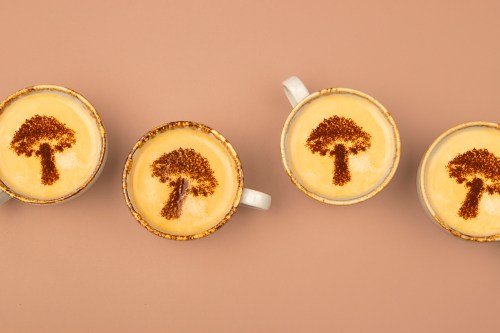Mushroom Coffee: Is it Good for You?
Thinking about making the switch from regular java to a more earthy option? Here's what experts want you to know.

Mushroom coffee has been making the rounds on TikTok lately, with fans touting it as an energy and focus-boosting alternative to coffee. Some reviewers love it, others cringe at the flavor. The one thing that’s for certain: This drink is having a buzzy moment in the zeitgeist.
Experts in This Article
registered dietitian and consultant with Balance One supplements
Dr. Bryan Quoc Le is a food scientist, food industry consultant, and author of the book 150 Food Science Questions Answered.
Often, mushroom coffee refers to a blend of dried mushroom and coffee in one beverage. Other times, it’s simply a mix of dried mushrooms that creates a brown, coffee-like beverage when mixed with water. Some TikTokers describe the flavor as “earthy,” while others compare it to mud water (or a “sewer drain on a golf course”).
“Mushroom coffee is a substitute for coffee made from dried mushrooms, most notably cordyceps, reishi, chaga, or other medicinal mushrooms,” says Bryan Quoc Le, PhD, a food scientist and founder of Mendocino Food Consulting. “Medicinal mushrooms are supposed to provide adaptogenic compounds that are said to improve focus, energy, and concentration.”
However, whether this earthy drink is worth the hype remains to be seen. Here’s what to know about mushroom coffee and if it makes sense to add to your morning repertoire.
What are the health benefits of mushroom coffee?
Mushrooms have long been used in traditional Chinese medicine and may indeed have benefits. Early research shows lion’s mane (a popular mushroom coffee ingredient) can protect against nervous system damage, which may be particularly helpful for those with multiple sclerosis or Parkinson’s disease.
“Coffee developers continue to create ways to integrate healthy alternatives or ingredients to their product in an attempt to attract the attention of healthy consumers,” says Trista Best, MPH, RD, a registered dietitian at The Candida Diet.
Meanwhile, a lab study on lung cells found that shiitake mushrooms (another go-to mushroom coffee component) could protect against cell damage, per 2020 research in Science of the Total Environment. PSK, a component of turkey tail mushroom, has even been used as an approved cancer treatment in Japan according to the National Cancer Institute, and has also traditionally been used to treat pulmonary diseases. However, more research on humans is needed to truly understand the benefits: “At this time, the biological benefits of medicinal mushrooms are under-researched, so it's still unclear precisely what they do and their mechanism of action,” says Dr. Le.
The true benefits are also debatable because the amount of medicinal mushrooms in each brew of mushroom coffee is likely not enough to hit the bioactive threshold for the compounds found in them—meaning they may not have a meaningful effect in your body. “Researchers have found that many of these mushrooms require 2 to 5 grams of material to have any effect, while most mushroom coffees may contain anywhere between 100 to 500 milligrams,” says Dr. Le.
However, if you find yourself guzzling too much java in the AM (and PM), mushroom elixirs could help you scale back—as long as it’s not mixed with coffee or otherwise has added caffeine. “In principle, mushroom ‘coffee’ can help individuals drink less caffeine and incorporate an alternative to the morning coffee or tea ritual,” says Dr. Le. “So for those who are trying to kick the caffeine habit, mushroom coffee offers a great alternative.”
It could also be more gentle on your enamel compared to traditional coffee. “Mushroom coffee is typically less acidic than traditional coffee,” says Sandip Sachar, DDS, founder at Sachar Dental NYC. “Acidic food and drinks contribute to enamel erosion.”
Are there any risks associated with drinking mushroom coffee?
As with most foods, mushrooms do pose an allergy risk in some people. “Although not well researched, there is evidence that certain mushrooms can cause allergic reactions in 1 to 2 percent of the population,” says Dr. Le.
While it could help you kick a caffeine habit, it may still stain your teeth like traditional coffee. “Unfortunately, due to dark pigmentation, mushroom coffee still stains teeth equally as much as traditional coffee,” says Dr. Sachar. “It contains tannins and chromogens that can yellow enamel just like regular coffee.”
The extracts in mushroom coffee can also be difficult to digest—and those who have kidney issues or general digestive woes can be more prone to those effects, per UCLA Health. Some types of mushrooms typically used in mushroom coffee, like chaga, contain high levels of oxalates. These are compounds that can put you at risk for kidney stones in large amounts.
So, is mushroom coffee worth it?
Though it has some benefits beyond your typical morning cup, mushroom java isn’t cheap. In fact, these brews are often at least twice as much as regular coffee, according to UCLA Health. And, of course, that’s all for benefits that may or may not exist.
A more economical way to get surefire benefits is to simply incorporate mushrooms into your diet by adding them raw or cooked into salads, soups, chili, and beyond. Fresh mushrooms can provide several nutrients like B vitamins, selenium, vitamin D, and potassium at the fraction of the cost of a mushroom elixir powder.










